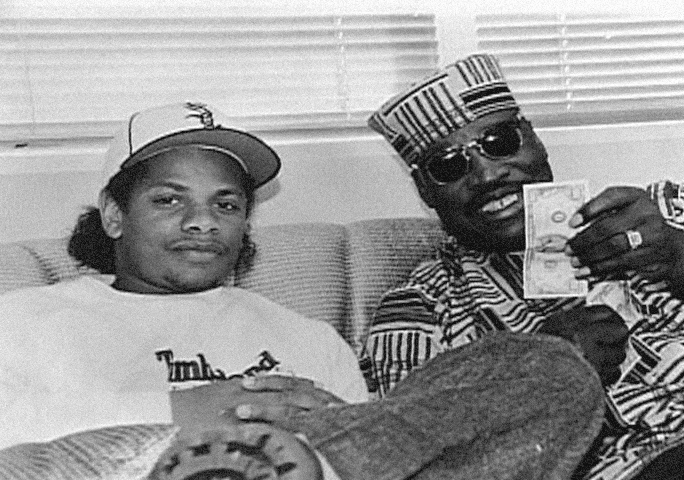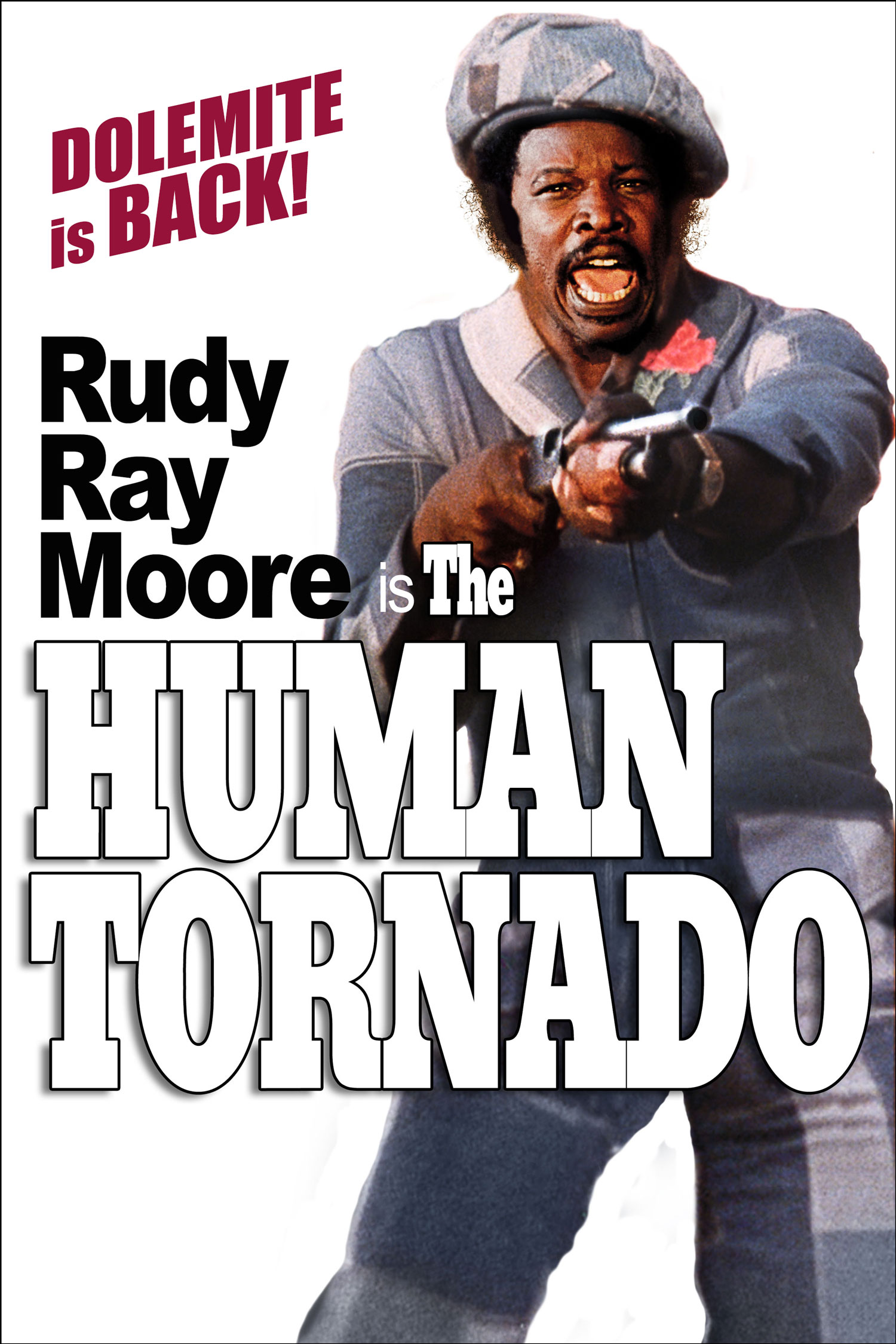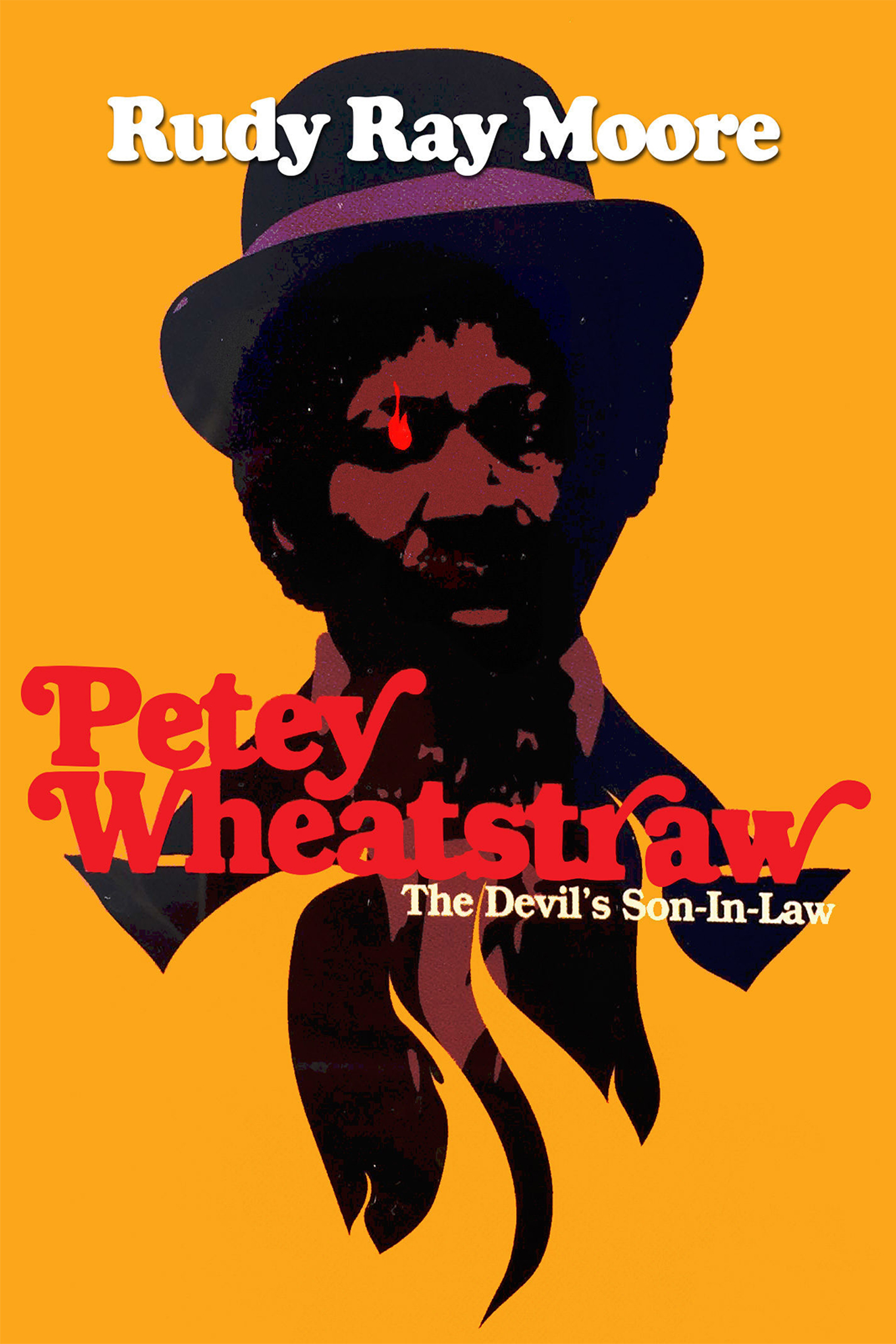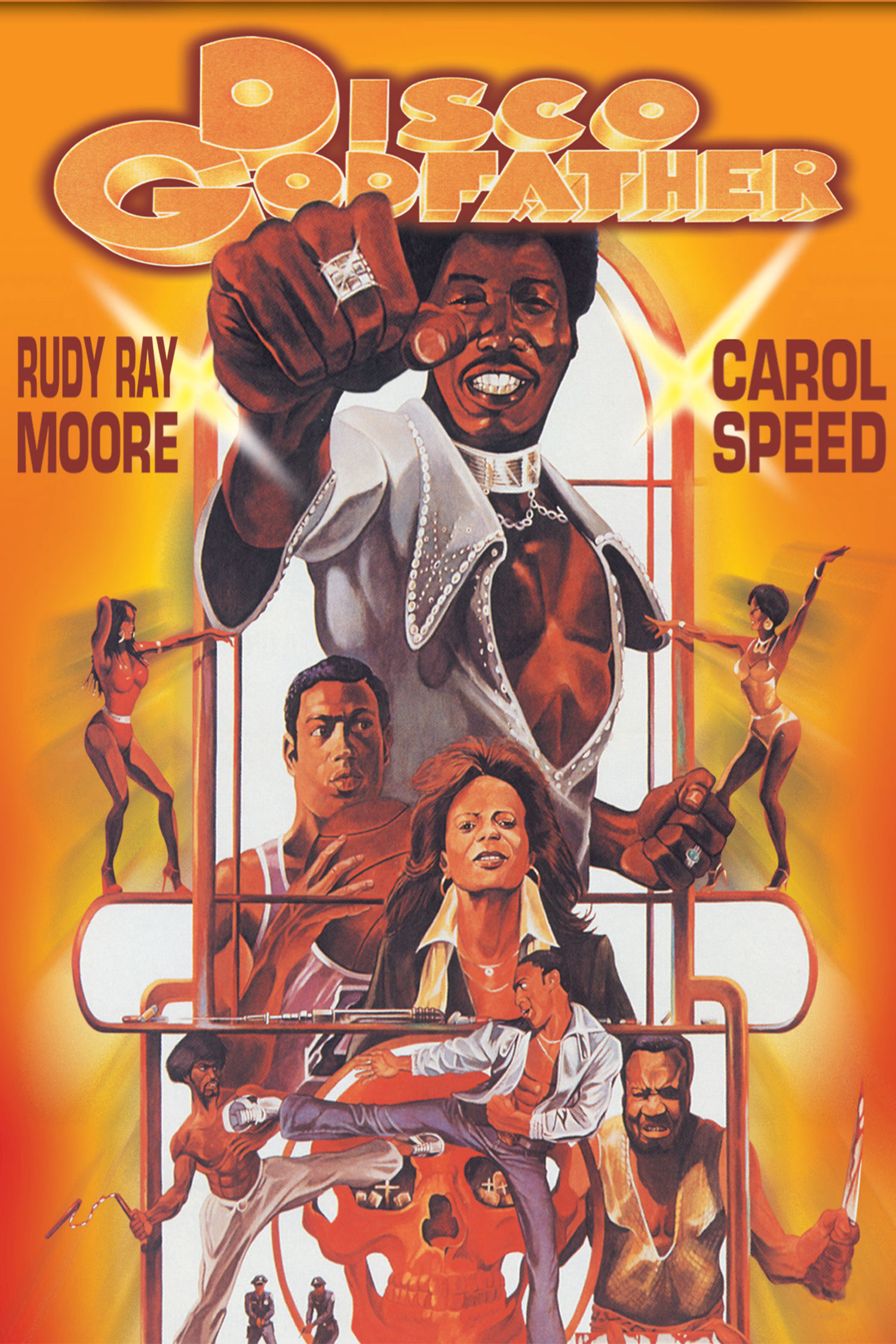“The Citizen Kane
of kung-fu pimpin’ movies”
![]()
–By Tracy Landecker–
Rudy Ray Moore is a classic symbol of cool, whose appeal defies racial, generational and national boundaries. Fans of comedy, hip hop, punk rock, and independent film consider him both a hero and a spokesperson for the independent spirit. His likeness, seen in ads for Altoids and cartoons, is instantly recognized by iconoclasts of all ages. A virtual pioneer of the D.I.Y. ethic, Moore produced and distributed his own records and movies outside the system for over 50 years. This freedom allowed him to present his uniquely hilarious, X-rated vision of the world, which continues to be a strong influence on contemporary filmmakers like Robert Rodriguez and the Hudlin Brothers. He is known throughout the music and film industries as The Godfather of Rap.
“In addition to being a blaxploitation film icon, his character’s fast-talking, street-walking persona served as a blueprint for the many hip-hop stars whom he would inspire.”

Filmmaker Quentin Tarantino, hip-hop icon Snoop Dogg and Eddie Murphy consider him a major influence; he’s been sampled by N.W.A., Dr. Dre, the Beastie Boys, Too Short, Busta Rhymes and Bone Thugs-n-Harmony; he appeared in a video by alt-rock band Cobra Verde and in a video game with Insane Clown Posse; he receives tens of thousands of hits on YouTube.com and on music download sites; his live performances, which attracted sell-out crowds made up primarily of 18 – 34-year-old Caucasians, continued up until his death; at a recent event, several Goth girls asked him to autograph their breasts. His creative vision and hilarious persona, tested over decades, remains timeless and accessible to anyone with a wild sense of humor, despite their race. What kind of man has this kind of power over so many? It can only be the Godfather of Rap…the first Black Action Hero…the one, the only RUDY RAY MOORE, a.k.a. DOLEMITE.
“These films are INDESCRIBABLY WONDERFUL”
—Director JOHN LANDIS
Moore’s timeless baddass / vengeful-pimp / anti-hero character ‘Dolemite’s popularity —once existing exclusively in the Black community— has, through the proliferation of Rap music, the phenomenon of the “cult/midnight movie”, and word of mouth spread among high school halls and comic book conventions, found an audience among general population that is 100 fold that of what the original films ever could have dreamed.
“Dolemite; a genre unto himself.”![]()
On December 2, 2008, Grindhouse Releasing and Xenon Pictures hosted a tribute to Rudy at the New Beverly Cinema in Los Angeles. The sellout event kicked off with a video retrospective to the life and work of Mr. Moore followed by screenings of Dolemite and its hit sequel, The Human Tornado. The video also included a salute from fans at a recent tribute held in London.
During the intermission, the audience was treated to a panel discussion and Q&A session moderated by Grindhouse Releasing’s Brian Quinn. The panel included many original cast and crew members from Rudy’s films, including actor/writer Jerry Jones (Dolemite, The Human Tornado), director Jamaa Fanaka (Penitentiary series, Soul Vengeance) and actor Sy Richardson (Petey Wheatstraw: The Devil’s Son-in-law, “Pushing Daisies”). Celebrities present at the event included Chris Parnell (“Saturday Night Live”), Diedrich Bader (“The Drew Carey Show”), and actor/singer/wrestling promoter Johnny Legend. It was a celebratory and loving tribute, filled with funny stories and outrageous anecdotes shared among friends and devotees of the one and only Rudy Ray Moore.
Rudy Ray Moore was the oldest of seven children, born March 17, 1927 in Fort Smith, Arkansas. The family moved to Cleveland when he was 15, and it was there, after seeing a local talent contest, that he decided to become an entertainer. In addition to his singing ability, which he had developed in church, Moore also studied modern dance, and began making the rounds of night clubs and talent shows.
He started out in the 1950s as an R&B singer, but racism, coupled with heavy competition from white performers of the day, such as Pat Boone, made it almost impossible for him to break into the mainstream. Yet rejection always drove Moore to new heights of ingenuity and resourcefulness. He left Cleveland for Los Angeles in the early sixties and worked at the legendary Dolphin’s of Hollywood record store as a DJ on the store’s in-house radio station, and as an MC at the California Club, where he reinvented himself as a comedian who would go on to produce some of the most influential comedy records of all time. It was in Los Angeles that he honed his chops and molded what would become his trademark material. His party records, Below the Belt (1959) and The Beatnik Scene (1962), among others, featured the first expletive-filled, “adults only” humor to fall on the public’s ears, opening doors for the likes of Richard Pryor and Redd Foxx, and inspiring a whole new generation of comedians like Eddie Griffin, the late Sam Kinison, and Eddie Murphy. Says comedian Paul Mooney: “Eddie is insane on Rudy Ray Moore. (He) has Rudy Ray Moore parties. We stay up all night and watch all his films.” He also joined forces and worked the clubs with comedienne LaWanda Page, who would find fame in her recurring role as Aunt Esther on “Sanford and Son”. Their close friendship would endure until her death in 2002.
Rudy Ray Moore (Dolemite) with fan..the late, great Eazy-E
“Eddie Murphy is insane on Rudy Ray Moore. He has Rudy Ray Moore parties. We stay up all night and watch all his films.”
Comedian Paul Mooney
Rudy and his collaborators drove through big-city and small-town streets with their car trunks stocked full of his albums, touring tirelessly from one side of the country to the other. In a 2001 interview, he told the St. Louis Post Dispatch, “I put records in my car and traveled and walked across the U.S. I walked to the ghetto communities and told people to take the record home and let their friends hear it. And before I left the city, my record would be a hit. This is how it started for me.”
“Dolemite was the cat all other cats wish to be, and all the kittens wish to be with. The Everyman as bad-ass, boogieing lover.”
John Ridley
– Oscar-winning screenwriter 12 Years a Slave
“His influence touched three generations –often inappropriately”
NATIONAL PUBLIC RADIO
DOLEMITE in POP CULTURE
On A Tribe Called Quest‘s 2016 “Whateva Will Be” Dolemite’s famous line “Girls, this muthehfucker’s got rhythm” is sampled.
According to some sources, Rudy Ray Moore is (along with Funkadelic bassist Bootsy Collins) the most sampled artist in Rap history. These include albums by Eazy-E, Snoop Dogg, NWA, The Beastie Boys, Busta Rhymes, Big Daddy Kane, and on Dr. Dre’s seminal “The Chronic”
In an episode of Matt Groening’s animated series “Futurama” the robot Bender explains that his composition is 40% Dolemite, which he describes as “…that righteous black mineral that don’t cop when out there’s heat all about ”
In the Jim Jarmusch film Broken Flowers (2005), Bill Murray’s character is discussing with his neighbor’s daughter who her father might be, guessing Dolemite as a possibility. (continued below)
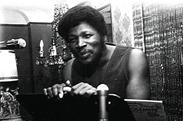
“’Stead of them kickin’ US in the ass, I’m kickin’ THEM in the ass.”
Rudy Ray Moore on his amazing success with independent films for Black audiences
His grassroots marketing campaigns proved to be quite successful and opened the doors to future success. His two 1970 releases, Eat Out More Often and This Pussy Belongs to Me, charted concurrently on the Billboard R&B Top 50, a record industry first. One of Moore’s best-known monikers (along with “King of the Party Records” and “High Sheriff of Hell”) is the well-deserved “Godfather of Rap”. His early party records feature what he called “toasts”—rhyming, over-the-top folk tales like “The Signifying Monkey” and “Shine and the Great Titanic”—recited against a musical background, creating some of the first rap records ever made.

DOLEMITE in POP CULTURE
(continued)
Snoop Dogg’s “Nuthin’ but a ‘G’ Thang” features the line “pimpin’ hos and clockin’ a grip like my name was Dolemite....”
From “Uzi (Pinky Ring)” by Wu-Tang Clan: “Superbad, who am I? Dolemite Classic!”
From “Down” by 311: “Lightning strikes, we be in that violent force of light/Guaranteed to turn it out as bad as Dolemite”.
From “Jam on Revenge” by Newcleus: “When I was a little baby boy, my momma gave me a brand new toy: 2 turntables with a mike, and I learned to rap like Dolemite”.
Big Daddy Kane’s album Taste of Chocolate contains the track, ““Big Daddy vs. Dolemite”, in which Dolemite beats Kane in a rap battle.
(continued below)

Rudy Ray Moore kicked down the door for every rapper today, making him an object of reverence for younger artists. Says Snoop Dogg, “If he wasn’t here there wouldn’t be no rap community…we should cherish every moment we spend with Rudy Ray Moore.” Says Layzie Bone of Bone Thugs-n-Harmony, “We can’t get away from him because he is our roots.” Proving that there is some justice in the world, Moore’s early R&B recordings were compiled on the 1991 release "Hully Gully Fever", which became an instant classic.
His two self released 1970 releases, Eat Out More Often and This Pussy Belongs to Me, charted concurrently on the Billboard R&B Top 50, a record industry first.
As seminal as his records are, Moore’s true influence can be seen in his movies, which are prime examples of Blaxploitation, giving back the “street cred” to a genre that had been diluted by major studio productions like Shaft and Superfly. By the early 1970s, Moore was not content being a successful comedian, and decided to seek film stardom. Using the money he made from sales of his albums and from ceaseless touring on the “Chit’lin’ Circuit”, he went on to produce his first film, Dolemite (1975), which was deemed “The Citizen Kane of blaxploitation” by The New York Times. He said of that time, “I would never have got on the screen unless I put myself on it”. Always ahead of the curve, Moore knew what the public wanted years before of the film industry did—Dolemite grossed $5,200,000 (modern equivalent: $26,000,000) in its first three months.
Dolemite presented audiences with an empowered and fearless black action hero, irresistible to woman and a scourge to the enemies of his people. Said Moore, “’Stead of them kickin’ me in the ass, I’m kickin’ them in the ass.”
Among the many highlights of the film are Moore’s outrageous insults, such as “you born insecure, ratsoup-eatin’ motherf**ker”, which have appeared as samples on records by Snoop Dogg, Dr. Dre, and N.W.A; and his eye-popping fashion sense, which included wildly colorful suits, animal prints and wide-brimmed hats, giving birth to the “pimp chic” look. The film also introduced Moore’s discoveries, singer James Ingram and actor Ernie Hudson. Since then, screenings of Dolemite continue to sell out in places like Montreal and Seattle, while Xenon Pictures has sold over one million units since the company’s inception (some video-store owners admitted having to constantly reorder Dolemite because it was their most stolen title).
DOLEMITE in POP CULTURE
(continued)
The video for Ol’ Dirty Bastard’s “Baby I Got Your Money” uses clips from Dolemite, eventually integrating ODB’s visage onto some of the characters.
The follow-up films to Dolemite, The Human Tornado, Petey Wheatstraw: The Devil's Son-inLaw and Disco Godfather, are also heralded as classics of the genre. According to actor/rapper Ice-T, “These are some of the maddest films of all time—as a black actor, he’s the greatest.” Screenwriter John Ridley stated, “Disco Godfather…has a permanent home in my DVD collection. If you appreciate what Rudy was all about, you can’t help but appreciate the film.” As further proof of the enduring impact of these films, director Quentin Tarantino chose The Human Tornado to be screened at his 2007 Grindhouse Festival in Los Angeles, while “Tonight Show” host Jay Leno regularly uses clips from the film on his show.
Moore’s audacity and ambition, on both a business and a creative level, earned him an ever-expanding audience over the years, and a presence in both mainstream and underground culture. His image has been used in advertisements for Altoids, while he’s also name-checked by the likes of the Wu-Tang Clan. His sold-out shows attracted youthful crowds that enthusiastically adored his bold humor, lining up at his appearances for merchandise and autographs. Dozens of websites run by iconoclasts of all ages, often selling merchandise with bootlegged images, are dedicated exclusively to Rudy. His films are among Xenon Pictures’ bestselling titles, and the current explosion of interest in exploitation cinema, evidenced by the Tarantino/Rodriguez release Grindhouse, pushed Moore farther into the spotlight. However, success never meant selling out. When Xenon Pictures negotiated with Miramax in 2001 to offer him sizable deal for the use of the Dolemite character, Moore refused it because he could not “bow down to the man”.
Wherever there was a venue that wanted him, Rudy Ray Moore was there—and many did, right up until the end. His 80th birthday was celebrated at conventions and theaters across the country, with Moore appearing at every one. Tireless, eccentrically visionary, and a true survivor, Rudy Ray Moore was an American original.
The entertainment maverick died on October 19, 2008 in Ohio of complications from pneumonia. According to a Xenon Pictures spokesman, he had been in declining health over the last several years, suffering a stroke in 2006, along with chronic diabetes and kidney problems.
“His influence touched three generations—often inappropriately and unapologetically— and we miss him already.”
—Defamer
Moore remained unstoppable, even in the face of his failing health, and was seen in Las Vegas a few months before his passing, riding his motorized scooter, wearing a sequined blazer and playing poker. He is survived by two siblings, his 95-year-old mother, and ‘play-daughter’ Yvette “Rusty” Wesson, who was at his bedside at the time of his death. According to Wesson, Moore’s final words were, “Dolemite’s damned day has finally arrived—I’m officially out of here.”
Upon his passing, Moore was celebrated in the Los Angeles Times, The New York Times, the Chicago Tribune, The Guardian (U.K.), Rolling Stone, EbonyJet, The Cleveland Plain Dealer, and on hundreds of entertainment blogs and fan sites around the world. Among the more notable was the obituary that appeared on The Onion A.V. Club website, which received over 100 comments quoting Moore’s films and routines.
On December 2, 2008, Grindhouse Releasing and Xenon Pictures hosted a tribute to Moore at the New Beverly Cinema in Los Angeles. The sellout event kicked off with a video retrospective of his life and work followed by screenings of Dolemite and its hit sequel, The Human Tornado. The video also included a salute from fans at a recent tribute held in London.
During the intermission, the audience was treated to a panel discussion and Q&A session moderated by Grindhouse Releasing’s Brian Quinn. The panel included many original cast and crew members from Moore’s films, including actor/writer Jerry Jones (Dolemite, The Human Tornado), director Jamaa Fanaka (Penitentiary series, Soul Vengeance) and actor Sy Richardson (Petey Wheatstraw: The Devil’s Son-in-law, “Pushing Daisies”). Celebrities present at the event included Chris Parnell (“Saturday Night Live”), Diedrich Bader (“The Drew Carey Show”), and actor/singer/wrestling promoter Johnny Legend. It was a celebratory and loving tribute, filled with funny stories and outrageous anecdotes shared among friends and devotees of the one and only Rudy Ray Moore.
--Tracy Landecker
© Xenon Pictures, Inc.


